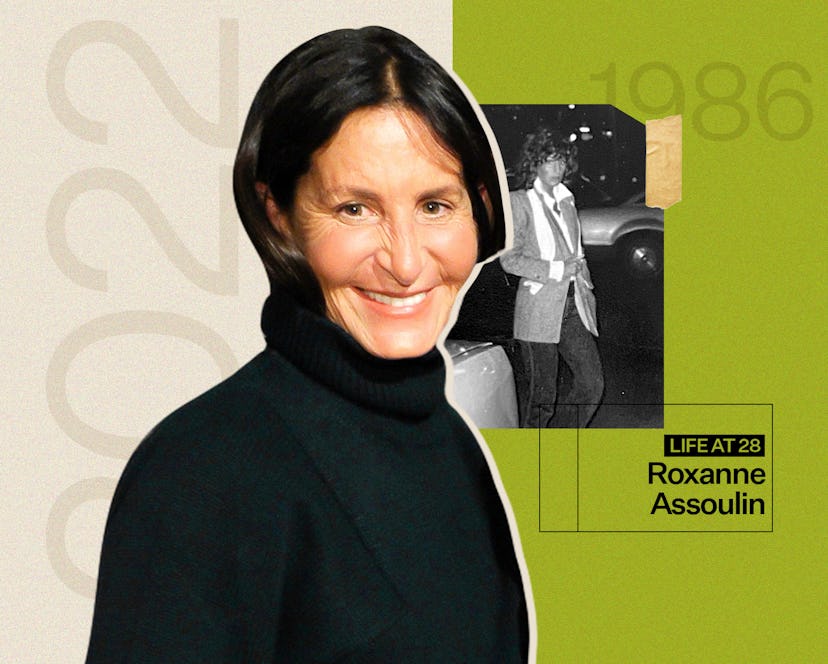28
At 28, Roxanne Assoulin Was Managing A Budding Jewelry Business
“I've had 15 minutes of fame a bunch of times.”

Roxanne Assoulin has a decades-long career of designing jewelry meant to spark conversation. Her staple rainbow stacked bracelets are customizable to bear any message, and her Alphabet Soup bracelets are reminiscent of the early aughts, which is no doubt why they’ve become increasingly popular with millenials and Gen Z over the years.
Assoulin describes her eponymous brand as “community-based and connection-based”. The brand’s tagline, “Jewelry that makes you smile” could not be more fitting — and Assoulin’s customers aren’t the only ones she wants to leave smiling. Many of the collections she has designed benefit social causes, with a percentage of profits going towards movements the designer is passionate about, including LGBTQ rights and Planned Parenthood.
Ahead, Assoulin chats with Bustle about life at 28, balancing motherhood and a career in jewelry design.
Take me back to age 28. Where were you at in your life, in your career?
It's when I started my business. I started doing hair accessories and I would go door to door. I sold to Vera Wang, Norma Kamali, Bloomingdale's, and Fiorucci. At 28, I got married, I had just had my second baby. My now ex-husband, was away on a business trip for six weeks and I had one four-year-old and one infant.
I made a bracelet for myself, and people started asking me about it. So, I started my line under my namesake, Roxanne Assoulin. It took off very quickly. So that's where I was at 28 — working out of my basement, wrapping bracelets.
What would you say your goals were at 28?
I had no career goals. I didn't know what I was doing. I met Marc Jacobs around that time and started doing jewelry for him. I did all the fashion shows, Bill Blass, Oscar de la Renta, Stephen Sprouse. I did all the Perry Ellis stuff when [Marc Jacobs] was grunge. It was the '80s and early '90s, and fashion was huge. Elsa Klensch was on television. We didn't have internet. We didn't know what anyone was doing till the clothing came out.
You mentioned that you launched your namesake brand at 28, but this is different than your current namesake brand, which launched in 2016. Can you explain the difference between the two?
I've had 15 minutes of fame a bunch of times. I actually started under my maiden name. Then I got married and put it under my married name, because at that time that's what you did. But then there was a point where we started to do private label
Roxanne Assoulin was very collectible vintage jewelry. We did a crystal skirt for Madonna. I wanted to do something more playful, so we started Lee Angel, which was named after my son, Lee. Each season we would have these huge accounts. It went into the private label sector. When direct-to-consumer came in, those companies started hurting.
I was about to close my business when I was playing with some tiles and said, "This would make a cute bracelet." That's how this was born again.
What advice would you give to yourself at 28?
I would say to a 28-year-old, don't take life so seriously. Lighten up. Life is going to do what life does no matter what you do, and your job is to flow with it and make the best decisions that you can make in the day that you're in. Your friendships will change, your relationships with your parents will change.
What is the most valuable thing that you've learned throughout your career?
One of the most valuable things [I’ve learned is] that everybody's just winging it. There is no master plan here. The world changes. There's a war, there's a recession. There's a flying saucer. Everything changes. The ability to be flexible, and to pivot, and to move quickly and gently without urgency, to me is a beautiful quality.
What advice do you have for up-and-coming designers, using what you've learned throughout your career and given how much the industry has changed?
I think humility is key in any business. When I started this, I didn't know what I was doing. I asked people "What do you think? How do you think I should do it? What do you think the price should be?” They would introduce me to people, and when I launched, they all championed me.
What do you have coming up next for you?
I always say I have one more life left. I'm not sure what it's going to be. There's a curiosity, and it's exciting.
Well, I'm sure everyone will be very excited to find out whatever it is.
So will I.
This interview has been edited and condensed for clarity.